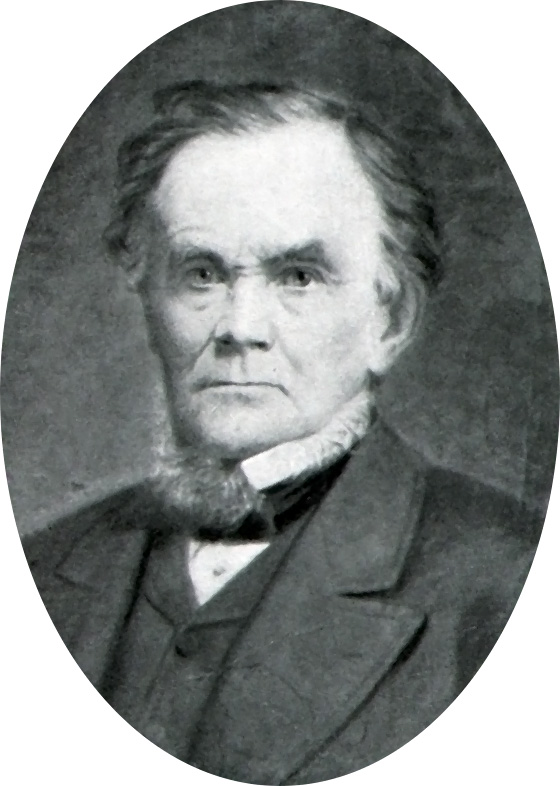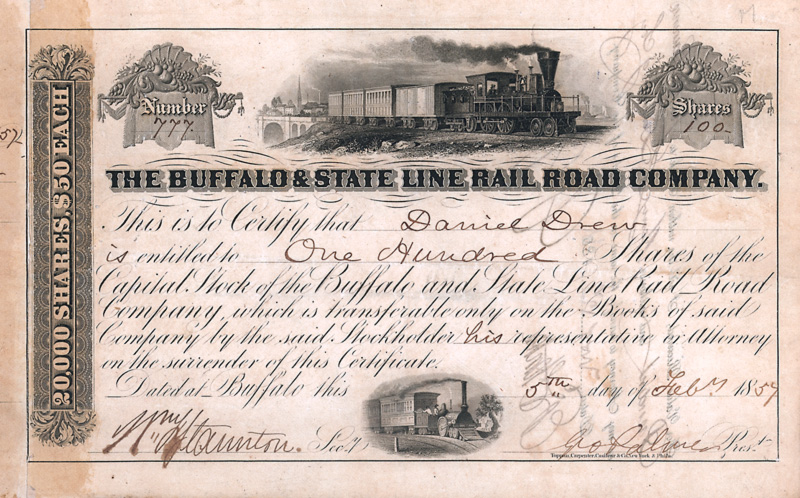|
Business Magnates, Industrialists, Railroad Tycoons, Capitalists, Financiers
|
||||
|
Daniel Drew
|
||||
 |
||||
| Daniel Drew (1797-1879) war ein US-amerikanischer Geschäftsmann.
Nach schlechter Schulausbildung kämpfte Drew nach dem Tod seines Vaters 1812 im Britisch-Amerikanischen Krieg. Nach dem Krieg eröffnete er ein erfolgreiches Viehtriebunternehmen. Im Jahr 1834 stieg er ins Dampfschifffahrtsgeschäft ein - in erfolgloser Konkurrenz zu Cornelius Vanderbilt - betrieb aber zahlreiche profitable Linien außerhalb von New York. Zehn Jahre später, 1844, gründete er das Maklergeschäft Drew, Robinson & Company, das sich nach dem Tod seiner Geschäftspartner 1854 auflöste. Drew arbeitete aber weiterhin als unabhängiger Makler. Im Jahr 1857 wurde er Vorstandsmitglied bei Erie Railroad und manipulierte in seiner Position den Aktienwert des Unternehmens. Drew kämpfte 1864 erneut mit Vanderbilt, als er begann mit Aktien der New York and Harlem Railroad zu spekulieren. Er betätigte sich als Leerverkäufer, doch Vanderbilt und dessen Partner kauften sämtliche Anteile, die Drew verkaufte, was ihren Wert innerhalb von fünf Monaten von 90$ auf 285$ pro Aktie steigerte. Drew verlor dadurch 500.000$. Um zu verhindern, dass Vanderbilt die Kontrolle über Erie Railroad gewinnt, gab Drew gemeinsam mit James Fisk und Jay Gould falsche Aktien heraus. Vanderbilt erlitt hohe Verluste und musste den dreien die Kontrolle des Unternehmens überlassen. Doch Fisk und Gould betrogen ihren Partner 1870, indem sie die Railroad-Aktien so manipulierten, dass Drew 1,5 Millionen Dollar verlor. Der Börsenkrach von 1873 kostete ihn noch mehr. 1876 überschritten Drews Schulden eine Million Dollar ohne zusätzliche Vermögenswerte und er musste Konkurs anmelden. Daniel Drew starb schließlich in Abhängigkeit von seinem Sohn 1879. |
||||
| Daniel Drew (1797-1879) was an American financier.
Drew was poorly educated. His father died when Daniel was fifteen years old. Drew enlisted and drilled, but because he enlisted too late, never fought in the War of 1812. After the war, he started a successful cattle-driving business. In 1823, he married Roxanna Mead. In 1834, he entered the steamship business, competing unsuccessfully with Cornelius Vanderbilt but running numerous profitable lines outside of New York. He founded the brokerage firm of Drew, Robinson & Company in 1844, which dissolved a decade later with the deaths of his partners. He continued to work in the brokerage business as an independent operator. Drew is popularly credited with introducing the term "watered stock" to the New York financial district, to describe company shares whose price has been temporarily manipulated upward; the term supposedly came from his time in the cattle business, when he would have his cattle drink water before selling them, to temporarily increase their weight. In 1857, Drew became a member of the board of directors of the Erie Railroad and used his position to manipulate the firm's stock price. In 1864, Drew once again struggled with Vanderbilt, speculating on the stock of the New York and Harlem Railroad. Drew was selling the stock short, but Vanderbilt and his associates bought every share he sold, ultimately causing the stock price to rise from 90 to 285 in five months. Drew lost $500,000. In 1866-1868, Drew engaged in the Erie War, in which Drew conspired along with fellow directors James Fisk and Jay Gould to issue stock to keep Vanderbilt from gaining control of the Erie Railroad. Vanderbilt, unaware of the increase in outstanding shares, kept buying Erie stock and sustained heavy losses, eventually conceding control of the railroad to the trio. In 1870, Fisk and Gould betrayed Drew, manipulating the stock price of the Erie Railroad and causing him to lose $1.5 million. {Fisk was killed in 1871 by a jealous rival over a mistress and Gould himself would later be swindled out of $1,000,000 worth of Erie railroad stock and never controlled the Erie Railroad}. The Panic of 1873 cost him still more, and by 1876, Drew filed for bankruptcy, with debts exceeding a million dollars and no viable assets. He died in 1879, dependent on his son for support. Drew, a devout Methodist, built churches in Carmel and Brewster, New York, contributed to the founding of Drew Theological Seminary in Madison, New Jersey, which is now part of Drew University, and Drew Seminary for Young Ladies in his home town of Carmel. |
||||
 |
||||
|
Stock certificate of the Buffalo & State Line Railroad Company, issued 1857 to Daniel Drew (hand signed by him on the back side)
|
||||
|